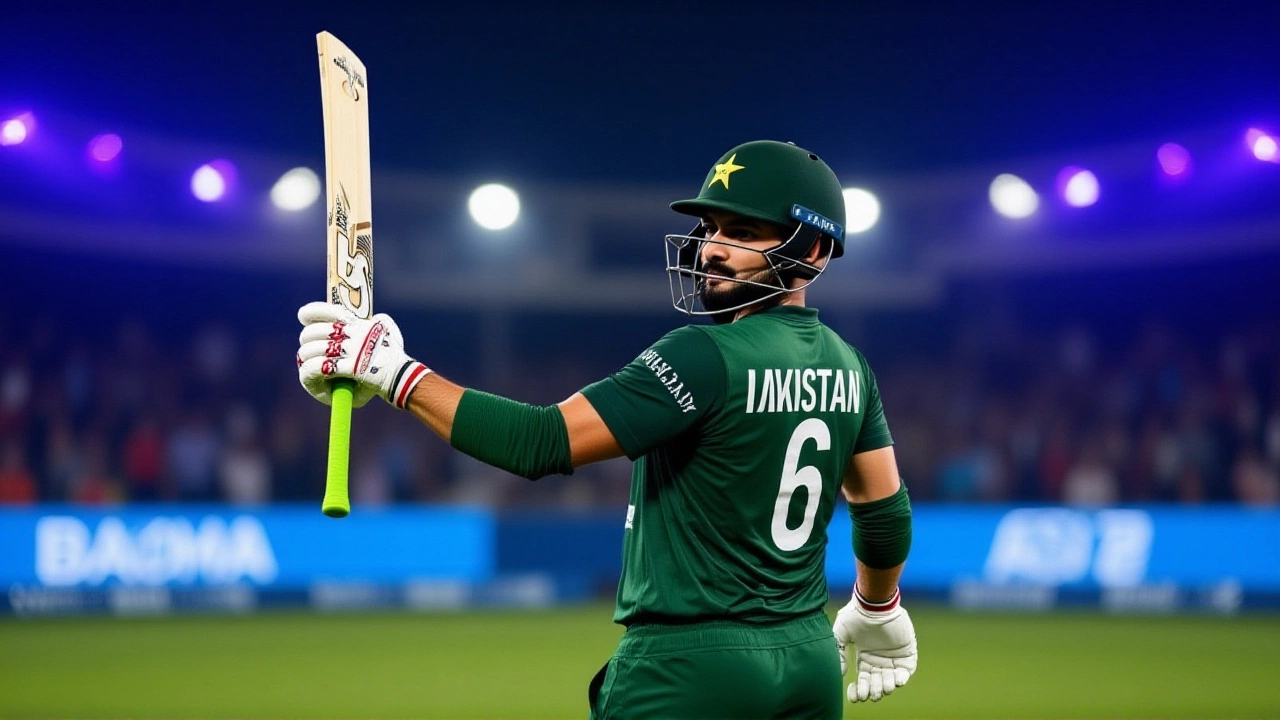When Sahibzada Mohammad Farhan raised his bat like an AK-47 after scoring 58 runs off 45 balls during the India vs Pakistan Asia Cup 2025 Super 4 matchUnited Arab Emirates on September 23, 2025, he didn’t just celebrate a half-century — he ignited a firestorm. The gesture, interpreted by fans and analysts alike as mimicking a firearm with the bat’s handle pointed toward his own chest, drew immediate condemnation across social media, from former players, and ultimately from the International Cricket Council (ICC). What followed wasn’t just a heated debate — it was a reckoning over where competitive spirit ends and dangerous symbolism begins.
The Moment That Broke the Internet
Farhan’s celebration came moments after he cracked a six off Axar Patel in the 10th over, his fifth boundary of the innings. He dropped into a crouch, raised the bat vertically, fingers wrapped around the handle as if gripping a rifle’s stock, then pointed the barrel — the rounded end of the bat — directly at his chest. No cheers erupted from the stands. Instead, silence. Then murmurs. Then viral clips.
By the time India chased down Pakistan’s 171/5 in the 19th over, the focus had shifted entirely from the scoreboard to the symbolism. Social media exploded. Memes compared Farhan’s pose to a suicide bomber’s final stance. Others noted the irony: MS Dhoni’s famous bat-raising celebration had the barrel pointed outward — toward opponents. Farhan’s pointed inward. "He didn’t aim at India," one YouTube analysis read. "He aimed at himself. And that’s scarier."
ICC’s Swift Response
The International Cricket Council (ICC) moved faster than anyone expected. Within 48 hours, match referee Richie Richardson convened a disciplinary hearing at the Pakistan team’s hotel in the United Arab Emirates. Sahibzada Farhan received a formal reprimand — a public warning that could carry weight in future misconduct cases. His teammate Haris Rauf, though not involved in the gesture, was fined 30% of his match fee for failing to report the incident promptly, a move that sent a clear message: silence is complicity.
"It’s not about intent," one ICC insider told reporters. "It’s about perception. In a region with decades of conflict, a bat shaped like a rifle? That’s not cricket. That’s a loaded gun in a crowded room."
Former Players Speak Out
Former Pakistani leg-spinner Danish Kaneria didn’t hold back. On his YouTube channel, he called Farhan’s celebration "a disgrace to the jersey." "World-class players respond with the bat, not with gestures," Kaneria said. "India responded on the field — Abhishek Sharma hit a six off Shaheen Afridi’s first ball. That’s how you answer pressure. Not with pretend rifles."
Even in Pakistan, voices of dissent grew louder. Veteran commentator Nadeem Omar noted, "We’ve always prided ourselves on playing hard, but never crude. This wasn’t passion — it was performance art with dangerous undertones."

The Political Shadow
Farhan tried to deflect. In his post-match press conference, he said: "I don’t care what people think. You should play aggressive cricket against every team." But then came the line that deepened the controversy: "We may have lost the game on the field, but we won the battle."
That phrase — "won the battle" — triggered alarm bells. Online, users began connecting it to "Operation Sindoor," a term used in some Indian media circles to reference the 2019 Pulwama attack response. The connection was tenuous at best, but in the charged atmosphere between India and Pakistan, even a whisper can become a shout. No official link was ever established, yet the damage was done. The gesture wasn’t just seen as unsportsmanlike — it was seen as politically provocative.
A Cultural Confusion: Farhan the Cricketer vs. Farhan the Actor
Adding to the noise, confusion erupted between Sahibzada Farhan and Bollywood actor Farhan Akhtar. Akhtar, whose film 120 Bahadur — about the 1962 Battle of Rezang La — releases November 21, 2025, has repeatedly said: "Patriotism is a beautiful feeling, but blind nationalism is a bad thing."
On social media, memes juxtaposed Akhtar’s measured words with Farhan’s bat gesture. "One man portrays soldiers who died facing forward," read one caption. "The other pretends to be one who turned the gun on himself."

What This Means for Cricket
This isn’t the first time a celebration crossed a line — remember Chris Gayle’s "gun" pose in 2015? But this was different. It happened in a match between two nuclear-armed nations with a history of war, terrorism, and diplomatic fractures. Cricket isn’t just sport here — it’s a proxy battlefield.
ICC’s decision to act swiftly is significant. It signals a new era: gestures that evoke violence, even metaphorically, will no longer be tolerated in international cricket. The body is now treating symbolic acts as potential breaches of the spirit of the game — not just technical violations.
What’s Next?
Farhan has not issued a public apology. He’s not suspended, but his reputation is fractured. Will he be picked for the next Asia Cup? Will Pakistan’s selectors prioritize discipline over raw talent? And will the ICC extend this policy to other sports?
Meanwhile, the India vs Pakistan Asia Cup 2025 Super 4 match will be remembered not for India’s win — but for the moment a bat became a weapon, and a player chose to point it inward.
Frequently Asked Questions
Why was Sahibzada Farhan reprimanded instead of fined like Haris Rauf?
Farhan received a formal reprimand because the ICC deemed his gesture a breach of conduct, but not one severe enough to warrant a financial penalty at this stage. Rauf, however, was fined for failing to report the incident — a violation of team conduct protocols. The reprimand serves as a warning that future offenses could lead to suspensions or heavier fines.
How did social media react to the gesture?
Social media users overwhelmingly condemned the gesture, with millions calling it "dangerous," "inappropriate," and "a glorification of violence." Many compared it to a suicide bomber’s stance due to the bat’s barrel pointing toward Farhan’s chest. Memes labeled him a "suicide bomber," while others contrasted it with Dhoni’s outward-pointing celebration. The hashtag #FarhanBatGestures trended across India, Pakistan, and global cricket forums.
Is this gesture banned under ICC rules?
The ICC’s Code of Conduct doesn’t explicitly ban "gun gestures," but it prohibits any behavior that brings the game into disrepute. The governing body has interpreted such symbolic acts — especially in high-tension matches — as violations under Clause 2.1 (conduct contrary to the spirit of cricket). This case sets a precedent for future disciplinary actions against similar symbolic gestures.
What’s the historical context of India-Pakistan cricket rivalries?
India and Pakistan have played 135 international matches since 1952, with over 70% of them in ICC tournaments. Every match carries political weight — from the 1987 World Cup to the 2011 semi-final. Celebrations, sledging, and on-field arguments are common, but symbolic gestures tied to violence or nationalism are new. This incident marks the first time a bat gesture has triggered an ICC disciplinary hearing over perceived political symbolism.
Could this affect Farhan’s future in international cricket?
Absolutely. While Farhan remains eligible to play, selectors may hesitate to pick him in high-stakes matches. His image is now tied to controversy, and Pakistan’s cricket board has been under pressure to promote "positive role models." If he repeats such behavior, a suspension is likely. For now, his future hinges on whether he can redefine himself through performance — not postures.
Why did the ICC fine Haris Rauf if he didn’t make the gesture?
Under ICC regulations, players are obligated to report misconduct by teammates. Rauf, as a senior member of the squad, was present during the celebration and did not intervene or report it immediately. The fine was a disciplinary measure to reinforce team accountability — sending a message that silence enables bad behavior, even if you’re not the one committing it.

